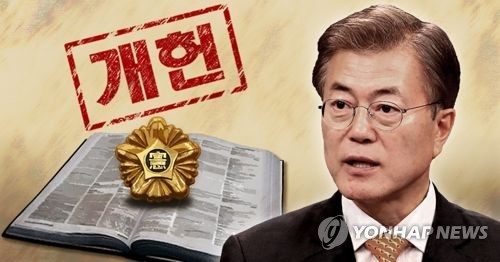The government was set to approve a constitutional revision proposal in a Cabinet meeting on Monday before sending it to the National Assembly as the main opposition party vows to do everything it can to derail it.
Once the proposal passes through the Cabinet meeting, President Moon Jae-in plans to sign it electronically from the United Arab Emirates, where he has been since Saturday, so that the measure can be sent to the National Assembly for approval.
The Cabinet meeting will be presided over by Prime Minister Lee Nak-yon.
The government put together the proposal on its own as opposition parties showed no signs of willingness to cooperate for its push to hold a national referendum on revising the highest law at the same time as June's mayoral and gubernatorial elections.
The proposal centers on changing the current single five-year presidential term to a maximum of two successive four-year terms, while curtailing presidential powers and strengthening the rights of the prime minister and the National Assembly.
The current five-year single term was introduced, along with a direct presidential election system, when the Constitution was last revised in 1987 after decades of military-backed authoritarian rule. It was designed mainly to prevent the sitting president from seeking to remain in power after a single term.
But the system has been under criticism for concentrating too much power in the presidency in a way that is prone to corruption. Such criticism rose in recent years after former Presidents Park Geun-hye and Lee Myung-bak were jailed for corruption charges.
The main opposition Liberty Korea Party and some minor opposition parties criticized the government for drawing up the proposal unilaterally, arguing that such an important proposal should be worked out through negotiations among parties.
In particular, the LKP denounced the proposal as a political show ahead of the June local elections. It has vowed to do everything it can to derail the measure, and even hinted at the possibility of holding street protests against it.
Cooperation from the main opposition party is key if the proposal is to pass through the National Assembly as passage requires approval from two-thirds of all 293 lawmakers. The ruling party has only 121 parliamentary seats, well short of the required 195 lawmakers, while the LKP has 116 lawmakers.


